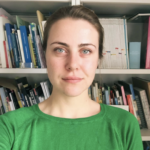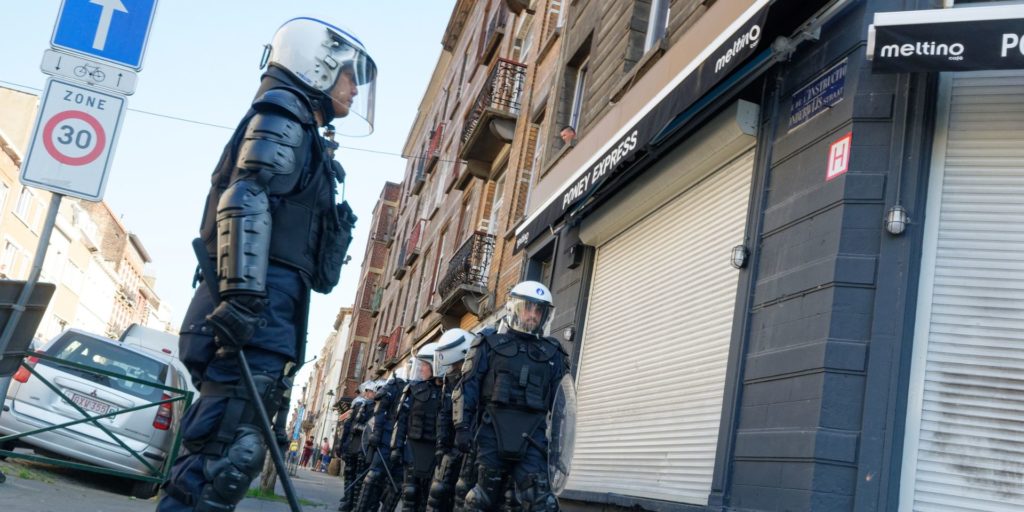A police control in Belgium is violent. Officers in plain clothes or in uniform in groups of up to ten, sometimes with police dogs, conduct controls on the streets, in cafés and parks.
The process can be volatile and humiliating. It can last up to 30 minutes, you might end up in the back of the police van being driven around, be stripped naked and searched either in the police van, or at the police station, you might be taken to the station simply because you don’t have your I.D. on you, you might have plastic zip-ties tightened around your wrists, it might happen multiple times a day, you might be shot, run over and killed.
Controls feel arbitrary and place you in a precarious position. If you dare to ask for an explanation as to why you’re being controlled, you might end up much worse than if you silently endure the humiliation.
And even if you silently endure the humiliating experience without objection, your resolve might be tested through provocation by the police officers.
Stories of police provocation are not rare. Indeed, they are part of regular street chatter in certain neighbourhoods in Brussels, especially Anneessens, Molenbeek-Saint-Jean, Anderlecht, Marollen, and Schaerbeek where controls are disproportionately conducted on youth of Moroccan heritage. For too many of them, fear of controls has become a reality of daily life, something you will hope to avoid.
On April 10, 2020, a 19-year-old young man of Moroccan hertiage, Adil, died while attempting to evade a police control at Place du Conseil in Anderlecht.
After leaving the Place by scooter, Adil was involved in a crash with a second police vehicle called to assist in the hunt for the young man. The young man died immediately.
This incident comes less than a year after the death of 17-year-old Mehdi Bouda, who was killed on August 20, 2019 by the police in Brussels. The young boy also of Moroccan heritage was trying to evade a police control and was hit by a police car and died.
A few months earlier, another youth was hit by the police while he was on his motorbike in Molenbeek-Saint-Jean on May 10, 2019, resulting in his hospitalisation.
In 2018, a two-year-old Iraqi-Kurdish child was killed by the police in Mons on the night of 16-17 May. The child was in a car driven by Iraqi nationals and was hit by a bullet shot by the police who were pursuing the vehicle.
In August 2015, 15-year-old Soulaïmane Jamili, also of Moroccan heritage, died attempting to avoid a control by STIB representatives and was hit by a train at the Osseghem metro in Molenbeek.
In January 2015, Abdelamine Benchik, a 19-year-old of Moroccan heritage, had his left leg amputated after a police car hit him in Laeken. Responding to the incident, Police officers published on Facebook statements such as ‘What is he complaining about?’ ‘In his country, they would have cut his hands,’ and ‘He will run slower next time.’
On April 19, 2009, Mohamed Saoudi, a municipal worker of Moroccan origin, was shot twice by the police and killed in Schaerbeek.
In 1998, Semira, a young Nigerian woman, was killed by policemen during a repatriation operation. Semira—who was fleeing her home country and seeking refuge in Brussels - was denied entry. During the repatriation to Nigeria, Semira sang to draw attention to her presence on the plane. A police officer inserted a pillow in her mouth, while another officer put his knee on Semira’s head, and her arms were twisted behind her back. Semira fell into a coma because of deoxygenation and died hours after arriving in hospital.
In the comment section of the report of Adil’s death published in the La Dernière Heure and Les Sports, commenters reproduced the language from Facebook in 2015 in response to Abdelamine Benchik’s amputation.
These comments reflect the quotidian and systemically racist anti-Arab sentiment that Belgian citizens with Moroccan background face within their country. One commenter wrote ‘confine them in their country of origin’ [confine ça dans leur pays d’origine], another wrote ‘in his country of origin, if they don’t stop them, the police shoot’ [dans son pays d’origine, si on ne s’arrêtes pas, les flics tirent !!!!]; ‘The only guilty one: that who fled the police when they asked to stop him. It couldn’t seem clearer’ [Un seul coupable : Celui qui s’enfuit quand la police lui demande de s’arrêter. Cela me semble on ne peut plus Clair !!!!’ ; and ‘he killed himself all alone’ [il s’est tué tout seul comme un grand.]
Given these conditions, avoiding a police control becomes a matter of life and death for a Belgian youth with Moroccan heritage, and thus, an attempt to evade one is not an admission of guilt but an effort to survive.
Adil fled the police control because he understood and feared what police could do to him: at its most base, it was an attempt to avoid humiliation, but there would also have been a grave fear for his safety and the possibility of police brutality. His response to flee in fright did not merit a police hunt that would ultimately result in his death.
Questions must be asked: Why was there a control in the first instance? Why was Adil pursued by the police after he attempted to avoid the control?
If the answer is ‘suspicion’ then we need to ask another question: Is being young, brown and male enough to warrant suspicion by the police in Belgium?
On his Facebook page dated April 13, Pascal Smet, the Brussels Secretary of State, questioned the pursuit of Adil by the police as motivated by the current confinement conditions during COVID-19: “Was it not possible to find another approach? Could we have come to find him at his house the next day and remind him of his responsibility?
But despite all their [the police] discourse about proximity, they may not have known his name.” [N’était-il pas possible de trouver une autre approche ? Aurait-on pu venir le trouver chez lui le lendemain et lui rappeler sa responsabilité ? Mais malgré tous leurs discours sur la proximité, ils ne connaissaient peut-être pas son nom.]
Regardless of ‘why’, what remains indisputable is that to be outside during the period of confinement is not a justification for the relentless pursuit and tragic death of Adil. Before us is an opportunity to interrogate police practice, and to platform the willingness of the Belgian state to enforce the impartiality of the law through police accountability.
The hostility that exists between the police and the youth of Belgium is only one part of a structural crisis — that is, the undeniable systemic racism that underpins Belgian criminal justice and their policing practices.
This is manifested in the harassment, assault and death of Belgians of Moroccan heritage by the police, as well as in their overrepresentation in the prison complex system.
Belgian youth of Moroccan descent are three times more likely to be controlled by a police officer than Anglo-Belgian (Put and Walgrave, 2006: 122).
Studies have demonstrated that minority youth are perceived by the wider community as responsible for ‘causing disorder’ (Vancluysen, Van Craen, & Ackaert 201l; Bovenkerk, 2001; Werdmölder, 2006; Paoli & Reuter, 2008).
The alienation of Belgians of Moroccan heritage demonstrates a deep fracture in Belgian society that must be repaired through official and impartial inquiry into policing practices in Belgium and holding individual police officers accountable for their actions.
Following the death of Adil, the youth of Anderlecht and the surrounding neighbourhoods jumped into action, demanding ‘Justice for Adil.’
Through social media platforms, there was a Brussels-wide call for action to memorialise Adil and protest police brutality.
On Saturday 11, a group of mostly young men took to the streets in an attempt to attract attention to this injustice.
Smet’s Facebook post also discussed the anger between the youth of Belgium and the police, stating that there has been ‘A breach of trust. Distrust. Misunderstanding. And downright hate. On both sides. [Une rupture de confiance. De la défiance. De l’incompréhension. Et carrément de la haine. Et ce des deux côtés.]
The violence of the protests, which included rock throwing, window smashing and stealing a police weapon, has become a desperate expression of the pervasive sense of hopelessness amongst the youth in their civic struggle to see police held accountable for their actions.
They seek justice not only for Adil, but for every minority youth that has been profiled by the police: Mehdi, Adil, Abdelamine, Mohamed and Soulaïmane are personifications of trauma. This is not a justification for the violence, but an explanation of the gravity of this social rupture.
This systemic alienation is not limited to policing practices but is also represented in unemployment.
In late 2019 the Brussels Institute of Statistics and Analysis (BISA) recorded that Molenbeek has 40% youth unemployment.
Al Jazeera reported that school drop-out rate for second-generation residents of Molenbeek is 21% for boys and 15% for girls.
There is an ethno-socio-economic emergency in Belgium: Minority communities are not being protected by the state — they are being marginalised and killed.
Efforts to ameliorate the situation for minority groups often exclude discussions with the youth at risk. Voices of the youth are oppressed, and not platformed or celebrated as bringing culture and diversity into Belgian society.
Ostensibly, there exists an unspoken consensus that Moroccan youth are expected to quietly endure racial profiling by state representatives without dissent. It seems that no matter the numbers of deaths, there is no accountability, and without accountability there is no hope of justice.
Without recourse to justice, systemic police brutality against Moroccan youth is met with rebellion. When there is no justice for these deaths, anger and fear that the state will not protect the Moroccan youth installs itself into community sentiment, deepening social fragmentation and mistrust.
The racial profiling that is embodied in policing practices and the reluctance of the state to hold police accountable for taking the lives of Belgian citizens necessitates urgent federal review and structural reform. Without such action, the lives of minority communities will continue to be crippled by fear of state violence that is triggered by the sight of those who we are told are there to protect us.
By Suzannah Henty


